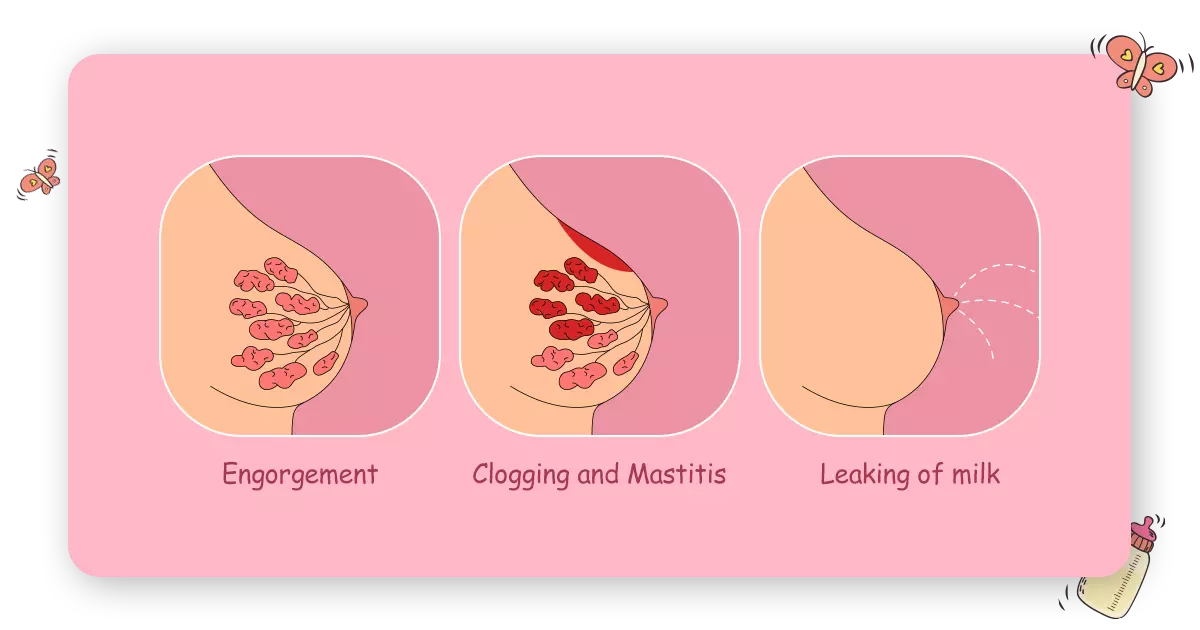How to Stop Milk Production If Not Breastfeeding

Breastfeeding is the best and safest way to feed a newborn baby. Most mothers are…
Breastfeeding is the best and safest way to feed a newborn baby. Most mothers are asked to do exclusive breastfeeding until the baby turns 6 months old. However, in some cases, mothers want to or have to stop milk production for reasons like the loss of a baby, miscarriage, stillbirth, taking other strong medications, clinical depression, or anything else. This could be before the 6-month mark or anytime after it.
Usually, if the mother stops feeding or pumping out the milk, the production comes down and stops eventually. But this may take longer for some nursing mothers. It could also be harder due to engorgement or other issues.
Before we move on, please understand that whatever your reason, it is always best to take the advice of your lactation expert or doctor when you decide to stop breastfeeding.
Here let’s try to know a little bit more about breastfeeding. We also have some tips and suggestions to help you stop milk production if not breastfeeding.
Causes of Milk Production
Lactation or the process of making milk in humans happens during pregnancy and after a woman delivers a baby. The mammary glands in your breast make milk when there are hormonal changes during pregnancy. The hormones like estrogen and progesterone are on the rise at this time. The mammary glands begin producing milk. The first milk called colostrum is prepared during pregnancy and it is of high nutritional benefits for the newborn.

After the baby is born, estrogen and progesterone take a back seat and the hormone prolactin comes into play. Prolactin helps the production of milk and even leads to engorgement of the breast. It ensures that more milk is produced when you feed or pump frequently.
Methods to Stop Milk Production
The obvious way of stopping milk production is to stop feeding or pumping. However, this is not always easy and involves much pain and discomfort.

There are a few other methods to stop milk production in your body.
Whichever method you opt for, always talk to your doctor before going ahead with it.
Risks and Side Effects
There are some complications that can follow your attempts to suppress lactation.

They are as follows:
- Engorgement: While trying to stop milk production, it is quite natural that the breast fills up with milk. Such over-enlargement of breasts could be very painful and uncomfortable for the mother.
- Clogging and Mastitis: Milk ducts can get clogged due to the milk staying in the same area. The breast could feel lumpy and painful. When a bacterial infection affects such blocked ducts, it is called mastitis. This situation warrants professional help and it is advisable to meet your doctor.
- Leaking of milk: It is quite natural that when your breast is full, some milk flows out without control. This is a very common issue. Using a breast pad to soak up the milk is the easiest way to deal with it. However, don’t let the moist pad stay in contact with your breast for too long.
Tips for Managing Discomfort
You should stop breastfeeding only when you are truly ready. If you need to stop it before your baby is 6 months old, make sure your reasons to do so are right.

Here are some useful tips for you to manage discomfort while stopping breastfeeding.
- Wean gradually so that the impact is mellow on you as well as your baby. If possible, start weaning at night so that the gap between the feeds is more.
- Manage the nutrition of your baby for the deficit in milk that it gets. Oh, wait! Not just the baby, you too need to have nutritious food because we know that this period could be painful and stressful for you.
- We know we told you not to pump or massage your breast while you are trying to stop feeding. However, if the engorgement is becoming too much for you to handle, pump out a tiny little bit of milk. If not for your breasts, it gives a slight relief to your mind!
- Always watch out for the signs your body gives. There are no hard and fast rules in these situations. Each woman’s body might react in a different way during these times.
- Do not wait for clogging and mastitis to get the better of you. When in doubt, contact your doctor without a second thought.
Conclusion
Your reason to stop breastfeeding can be different from your friend’s. The time you choose to do so may also vary. Whenever you do, you may use methods like gradual weaning, ice packs, cabbage leaves, etc. The process will most likely involve some pain and discomfort. However, these are usually manageable. If any signs in your body or mind are bothering you during this period, take support from your doctor immediately.

